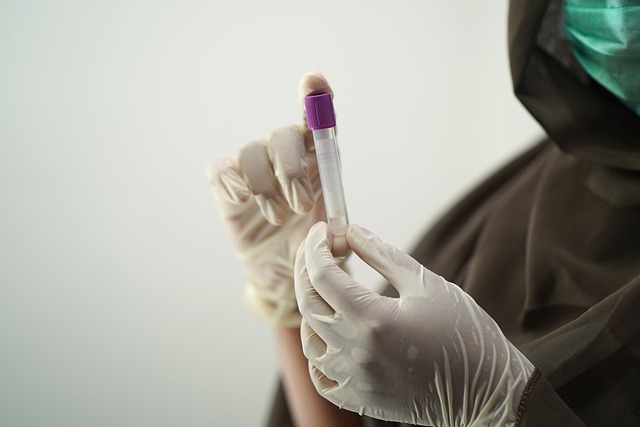The UK Diabetes Blood Test is essential for managing diabetes by monitoring blood sugar levels and assessing Vitamin B12 status. Given the high incidence of B12 deficiency in individuals with diabetes due to factors like poor circulation and neuropathy, regular testing is crucial for early detection and intervention. The National Health Service (NHS) guidelines include B12 measurements in the screening process, highlighting the importance of identifying potential nutritional deficiencies. This dual-function approach ensures better health outcomes by addressing both metabolic and nutritional aspects of patient care, potentially reducing the risk of complications associated with diabetes and B12 deficiency. The test is non-invasive, reliable, and provides a comprehensive health overview for those managing diabetes, with access available through both NHS and private healthcare services in the UK. It is particularly important for individuals at higher risk of B12 deficiency, including those with type 1 diabetes, the elderly, vegetarians, vegans, and those on medications like metformin, to have regular B12 levels checked as part of a proactive approach to healthcare management in the UK. Regular UK Diabetes Blood Tests are key to preventing long-term health issues related to B12 deficiency and ensuring effective diabetes management.
Vitamin B12 plays a pivotal role in maintaining health, particularly for individuals managing diabetes within the UK. Its significance in cellular function and metabolism is undeniable, yet deficiencies can often go unnoticed, with subtle symptoms that mimic other conditions. This article demystifies the process of detecting Vitamin B12 deficiency through blood tests, a critical tool for diabetes management in the UK. We will delve into understanding who should be vigilant about this nutrient, interpret the nuances of blood test results, and explore effective strategies for managing diagnosed deficiencies. By shedding light on these aspects, we aim to empower individuals with the knowledge to proactively manage their health and ensure that Vitamin B12 deficiency does not undermine their well-being or diabetes control.
- Understanding Vitamin B12 Deficiency in the UK: The Role of Diabetes Blood Tests
- This section would cover the importance of Vitamin B12 for individuals with diabetes, how it affects glucose metabolism, and the rationale behind checking B12 levels through blood tests in the context of diabetes management in the UK. It would also discuss who should consider getting a B12 test and the implications of low B12 levels on health.
Understanding Vitamin B12 Deficiency in the UK: The Role of Diabetes Blood Tests

In the UK, Vitamin B12 deficiency is a prevalent concern, particularly among individuals with diabetes. The importance of regular blood tests in this context cannot be overstated, as they serve as a critical diagnostic tool for identifying and managing such deficiencies. Diabetes blood tests in the UK are not solely for monitoring blood glucose levels; they also provide a comprehensive overview of an individual’s vitamin status, including B12 levels. For those with diabetes, the risk of B12 deficiency is heightened due to factors like poor circulation, neuropathy, and dietary limitations that can affect nutrient absorption. Consequently, incorporating Vitamin B12 measurements into UK Diabetes Blood Tests is pivotal for early detection and intervention, ensuring better health outcomes for those managing diabetes.
The UK’s National Health Service (NHS) provides guidelines for the frequency and types of blood tests required for diabetic patients, with a focus on screening for potential nutritional deficiencies like B12. This proactive approach to healthcare is essential in a country where diabetes prevalence continues to rise. By integrating Vitamin B12 checks into standard diabetes screenings, healthcare providers can better address the multifaceted needs of their patients, potentially reducing complications associated with both diabetes and B12 deficiency. The UK Diabetes Blood Test thus plays a dual role: monitoring blood sugar levels and assessing nutritional status, thereby offering a holistic view of an individual’s health.

In the UK, maintaining optimal health involves regular check-ups and diagnostic tests, particularly for conditions like diabetes which can be indicative of Vitamin B12 deficiency. Blood tests are a critical tool in this regard, providing a clear picture of an individual’s nutritional status. For those with diabetes or those at risk, monitoring B12 levels is crucial due to the heightened susceptibility to its deficiency. The UK Diabetes Blood Test specifically checks for Vitamin B12 and other key nutrients that are essential for the proper function of the body’s metabolic processes. Early detection through this test can help prevent complications associated with a B12 deficit, such as anaemia or neurological issues. It is a non-invasive procedure that offers reliable results, enabling healthcare providers to tailor treatments effectively. Regular testing and management of Vitamin B12 levels are vital for individuals with diabetes, as it ensures the maintenance of overall health and wellbeing, and can prevent the long-term consequences of deficiency.
The process of detecting a B12 deficiency via blood tests in the UK is streamlined and accessible through both NHS and private healthcare services. The test measures the amount of Vitamin B12 present in the bloodstream, distinguishing between adequate and insufficient levels. For those with diabetes, this routine examination is part of a comprehensive care plan that includes monitoring glycaemic control and other metabolic parameters. It is a proactive step towards safeguarding health, as B12 plays a pivotal role in the production of DNA and red blood cells, and its deficiency can lead to a host of health issues. The UK Diabetes Blood Test, therefore, serves as an essential diagnostic tool for early intervention and management of B12 levels among diabetic patients, ensuring they receive the necessary supplementation or dietary adjustments if needed.
This section would cover the importance of Vitamin B12 for individuals with diabetes, how it affects glucose metabolism, and the rationale behind checking B12 levels through blood tests in the context of diabetes management in the UK. It would also discuss who should consider getting a B12 test and the implications of low B12 levels on health.

Individuals with diabetes, particularly those with type 1 diabetes and those who are at risk of developing diabetes-related complications, should be cognizant of their Vitamin B12 levels. This is because B12 plays a pivotal role in glucose metabolism, influencing how cells convert glucose into energy. Adequate B12 levels ensure the efficient functioning of insulin receptors and can prevent neuropathy, a common complication among those with diabetes. In the UK, where dietary patterns may influence B12 absorption, regular blood tests to measure Vitamin B12 concentrations are integral to effective diabetes management. These tests help identify individuals who might be at risk of deficiency, which can lead to anemia and neurological issues, further exacerbating the challenges faced by those with diabetes.
Diabetes complicates B12 absorption as the condition can affect gastrointestinal function, potentially leading to a deficiency even in individuals with a balanced diet. Those at higher risk, such as the elderly, vegetarians, and vegans, or those undergoing certain medications like metformin, should consider getting a Vitamin B12 test. Regular monitoring of B12 levels is essential for those with diabetes to maintain overall health and prevent complications arising from deficiencies. In the UK, healthcare guidelines recommend that individuals over 60 years of age, as well as those who fall into higher-risk categories due to dietary habits or medication use, should discuss with their healthcare provider the frequency and necessity of B12 testing. This proactive approach to B12 monitoring is crucial for maintaining optimal health outcomes for people with diabetes in the UK.
In conclusion, regular UK Diabetes Blood Tests are pivotal in early detection and management of Vitamin B12 deficiency, particularly for those with diabetes. This condition can significantly impact glucose metabolism, leading to a host of complications if left undiagnosed or untreated. It is imperative for individuals at risk, including those with diabetes, to consider routine B12 level checks. Doing so facilitates timely intervention and support for maintaining overall health and wellbeing in the UK population. Recognising the signs and opting for blood tests can prevent adverse outcomes associated with this deficiency, ensuring a better quality of life for those managing diabetes.
